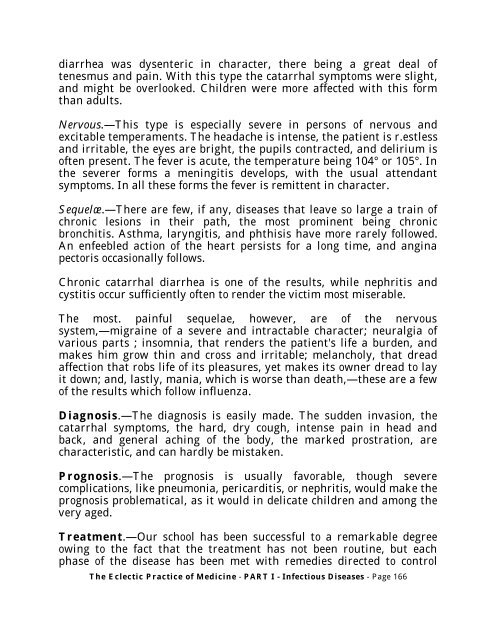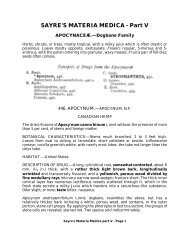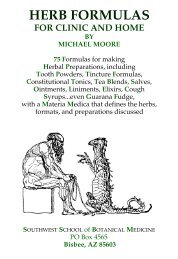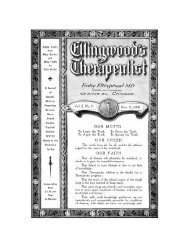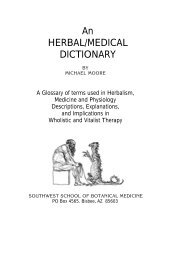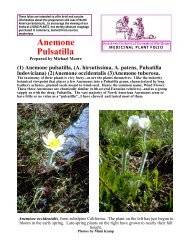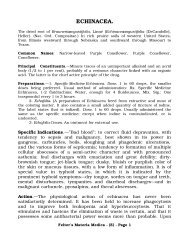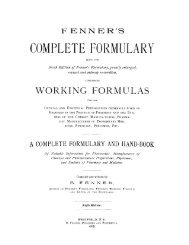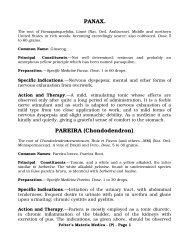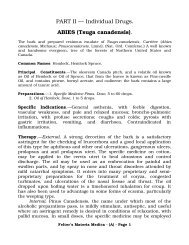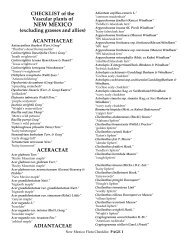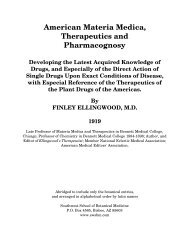SCARLET FEVER. Synonyms.—Scarlatina; Scarlet Rash. Definition ...
SCARLET FEVER. Synonyms.—Scarlatina; Scarlet Rash. Definition ...
SCARLET FEVER. Synonyms.—Scarlatina; Scarlet Rash. Definition ...
You also want an ePaper? Increase the reach of your titles
YUMPU automatically turns print PDFs into web optimized ePapers that Google loves.
diarrhea was dysenteric in character, there being a great deal of<br />
tenesmus and pain. With this type the catarrhal symptoms were slight,<br />
and might be overlooked. Children were more affected with this form<br />
than adults.<br />
Nervous.—This type is especially severe in persons of nervous and<br />
excitable temperaments. The headache is intense, the patient is r.estless<br />
and irritable, the eyes are bright, the pupils contracted, and delirium is<br />
often present. The fever is acute, the temperature being 104° or 105°. In<br />
the severer forms a meningitis develops, with the usual attendant<br />
symptoms. In all these forms the fever is remittent in character.<br />
Sequelæ.—There are few, if any, diseases that leave so large a train of<br />
chronic lesions in their path, the most prominent being chronic<br />
bronchitis. Asthma, laryngitis, and phthisis have more rarely followed.<br />
An enfeebled action of the heart persists for a long time, and angina<br />
pectoris occasionally follows.<br />
Chronic catarrhal diarrhea is one of the results, while nephritis and<br />
cystitis occur sufficiently often to render the victim most miserable.<br />
The most. painful sequelae, however, are of the nervous<br />
system,—migraine of a severe and intractable character; neuralgia of<br />
various parts ; insomnia, that renders the patient's life a burden, and<br />
makes him grow thin and cross and irritable; melancholy, that dread<br />
affection that robs life of its pleasures, yet makes its owner dread to lay<br />
it down; and, lastly, mania, which is worse than death,—these are a few<br />
of the results which follow influenza.<br />
Diagnosis.—The diagnosis is easily made. The sudden invasion, the<br />
catarrhal symptoms, the hard, dry cough, intense pain in head and<br />
back, and general aching of the body, the marked prostration, are<br />
characteristic, and can hardly be mistaken.<br />
Prognosis.—The prognosis is usually favorable, though severe<br />
complications, like pneumonia, pericarditis, or nephritis, would make the<br />
prognosis problematical, as it would in delicate children and among the<br />
very aged.<br />
Treatment.—Our school has been successful to a remarkable degree<br />
owing to the fact that the treatment has not been routine, but each<br />
phase of the disease has been met with remedies directed to control<br />
The Eclectic Practice of Medicine - PART I - Infectious Diseases - Page 166


